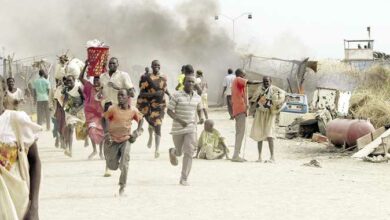United Nations — A divided UN Security Council on Monday discussed the idea of authorizing a no-fly zone over Libya, but no consensus emerged among its 15 members and Russia said it had questions about the proposal.
France, which along with Britain has led calls for an enforced ban on military flights across the North African oil-producing state, said it hoped the Arab League decision to ask the council to impose a no-fly zone would persuade reluctant members to support it.
"Now that there is this Arab League statement, we do hope that it's a game changer for the other members of the council," French UN Ambassador Gerard Araud said before the closed-door council meeting.
After the inconclusive meeting finished, Araud said he was still hopeful of getting a no-fly zone resolution approved. "It's possible," he said. "There was no total refusal. There were concerns, questions, but I think we are moving forward."
He said the council should act with greater urgency given the situation on the ground in Libya, where forces loyal to leader Muammar Qadhafi have launched a fierce counter-offensive against rebels trying to oust him and end his 41-year rule.
"We would prefer to act as quickly as possible, and we want that our partners on the council have the same sense of urgency that we have," he said. "That's the small regret that I have."
Council diplomats said the French goal of getting the council to vote on the no-fly zone by mid-week was ambitious.
Russian Ambassador Vitaly Churkin told reporters the council was not yet in a position to vote on a no-fly zone and a number of council members needed more information.
"Fundamental questions need to be answered, not just what we need to do, but how it's going to be done," he said. "If there is a no-fly zone, who is going to implement (it)?…Without those details or answers to those questions, it's very hard to make a responsible decision."
US READY TO DISCUSS NO-FLY ZONE
Churkin added that Moscow remained "open-minded" and had not rejected the idea of a no-fly zone.
German Ambassador Peter Wittig said Berlin supports toughening the sanctions approved on 26 February by the Security Council against Qadhafi, his family and inner circle, along with an arms embargo for the country. But Wittig said Germany needed more specifics about what a no-fly zone would entail.
"Questions were raised," he said. "We raised some questions and some of the questions are still unanswered."
US Ambassador Susan Rice told council members Washington was open to discussion of a no-fly zone, as part of a broader plan, but added that it was unlikely to stop the killing by itself, a council diplomat told Reuters.
"She also said that the United States would only participate in a no-fly zone if the Arab countries in the region support it in a meaningful way," the diplomat said.
Diplomats said the Germans were open to the idea of arming the rebels, though British Prime Minister David Cameron told Britain's parliament that would be problematic, partly due to a UN arms embargo, which restricts all arms sales to Libya.
He added there were "practical problems and questions about how quickly it would actually lead to any material effect."
Lebanese Ambassador Nawaf Salam, the sole Arab representative on the council, told reporters his delegation would be helping to prepare a draft resolution. He said Lebanon wanted the council "to act as swiftly as possible."
"We think it is not only a legitimate request, it is a necessary request. Measures ought to be taken to stop the violence, to put an end to the…situation in Libya, to protect the civilians there," he said.
In addition to the United States, Germany and Russia, other members with questions about the no-fly zone issue include South Africa, Portugal and Brazil, diplomats told Reuters.
In order to pass, council resolutions need nine votes in favor and no vetoes from the five permanent members. NATO, the most likely candidate for enforcing a no-fly zone, has made clear that Security Council authorization would be required if it was to get involved in such an operation.




